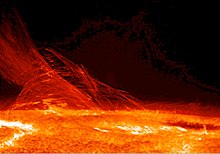
Back Warmte Afrikaans ሙቀት Amharic Calor AN Hāt ANG उष्मा ANP حرارة Arabic حرارة ARZ Calor AST Lupi Aymara İstilik Azerbaijani

Heat, or thermal energy, is the sum of the kinetic energy of atoms or molecules. In thermodynamics, heat means energy which is moved between two things when one of them has a higher temperature than the other.
Adding heat to something increases its temperature. Heat is not the same as temperature. The temperature of an object is the measure of the average speed of the moving particles in it. The energy of the particles is called the internal energy. When an object is heated, its internal energy can increase to make the object hotter. The first law of thermodynamics says that the increase in internal energy is equal to the heat added minus the work done on the surroundings.
Heat can also be defined as the amount of thermal energy in a system.[1] Thermal energy is the type of energy that a thing has because of its temperature. In thermodynamics, thermal energy is the internal energy present in a system in a state of thermodynamic equilibrium because of its temperature.[2] Heat is defined as a spontaneous flow of energy (energy in transit) from one object to another, caused by a difference in temperature between two objects. Objects do not possess heat.[3]
- ↑ "How Physicists Define Heat". ThoughtCo. Retrieved 2018-04-24.
- ↑ Thermal energy - Britannica
- ↑ Schroeder, Daniel, R. (2000). Thermal Physics. New York: Addison Wesley Longman. ISBN 0201380277.
{{cite book}}: CS1 maint: multiple names: authors list (link)